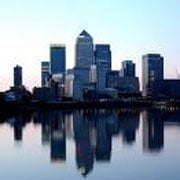In January
the Royal Bank of Scotland recorded the biggest loss in British corporate
history – £28bn. Just three months ago New Labour bunged £20bn of our money at RBS
to help prop it up. We have since made a £12.5bn loss on our holding as share
prices headed south. Where did our money go? It seems to have disappeared in a
puff of smoke. So the government has
decided to give them another £5bn of our money. The bank’s worth is
disappearing by the day as its share price evaporates. At the time of writing
the total share price of the 300 year old bank was just £4bn. In 2007 it was
£78bn.
If shares
in RBS continue to slide, depositors may well conclude that their money is just
disappearing down a big black hole. If so, they could all demand their money
back, leading to a run on the bank like the one we saw on Northern Rock 18
months ago.
It’s not
just RBS. In the autumn Alistair Darling and Gordon Brown pumped £37bn into the
banks to keep them afloat, plus various guarantees that committed taxpayers to
a possible total bill of £500bn. Three months later it’s all gone and the banks
are back with the begging bowl.
What’s
going on? Apparently the banks used the last load of money to firm up their
balance sheets. Their accounts have been looking so sick because the bankers
have just gone through a mad patch of ‘casino banking’ as Will Hutton calls it.
Their assets are worthless. We suggest they go off and join Gamblers Anonymous,
not come to us with their hands out.
How much more
are the government committing us to? No figure has been mentioned. But there
are dark rumours that the banks between them may have £200bn in dodgy assets. We
could be committed to underwrite all this. The opposition parties have
correctly criticised New Labour for in effect writing the banks a blank cheque.
The trouble
is, the banks can wreak a lot of damage on the rest of the economy. JCB has
laid more workers off in January, after previous waves of redundancies. They
say nobody’s buying their equipment because firms can’t get loans from their
banks any more. Instead of lending to those who, now more than ever, need the
money to keep production going the banks are ‘recapitalising’, squirreling every
penny away in their vaults. Bank lending has dried up, and that is putting
millions of ordinary people’s livelihoods at risk. The Bank of England has
slashed and slashed interest rates. Still the banks won’t lend. What will it
take to make them do what they are supposed to do anyway?
The old
justification for capitalist ownership of banks was that, while making money
for themselves, they incidentally grease the wheels of industry. In the present
crisis they are making it quite clear that their profits come first and the
rest of us can go to hell.
The January
rescue attempt was greeted by further falls in the stricken banks’ share prices
on the stock exchange. It has already failed, and been seen to have failed.
Alistair
Darling told the House of Commons, “We have the clear view that British banks
are best owned and managed commercially, and not by the government.” He is
living in fantasyland. What did New Labour do while Fred ‘the shred’ Goodwin
was running RBS into the ground? They gave him a knighthood!
The capitalist banks have failed. They should
be nationalised under workers’ control and management. They should be a public
utility not a white elephant we have to feed with endless sums of our money,
while wiping up their excrement at the same time.
The
instability of the banking system poses wider dangers to the British economy.
Economists are already speaking of London as ‘Iceland on the Thames.’ Because
of the over-dependence of British capitalism on financial prestidigitation and
conjuring, we are all tremendously exposed to a financial collapse. The banking
crisis and the collapse of the pound are connected. As Will Hutton says
(Observer 18.01.09), “Unless we are decisive Britain faces bankruptcy.”
Philip
Stephens in the Financial Times (20.01.09) headlines his column, “Shoot the
bankers, nationalise the banks.” His lighthearted remarks end, “For the moment,
though, I cannot think of a more popular policy than shooting the bankers and
nationalising the banks. It might even win Mr. Brown an election. Come to think
of it, it could also be the way to get us out of this mess.” The thing is, he’s
right. The case for taking over the banks has become overwhelming.






